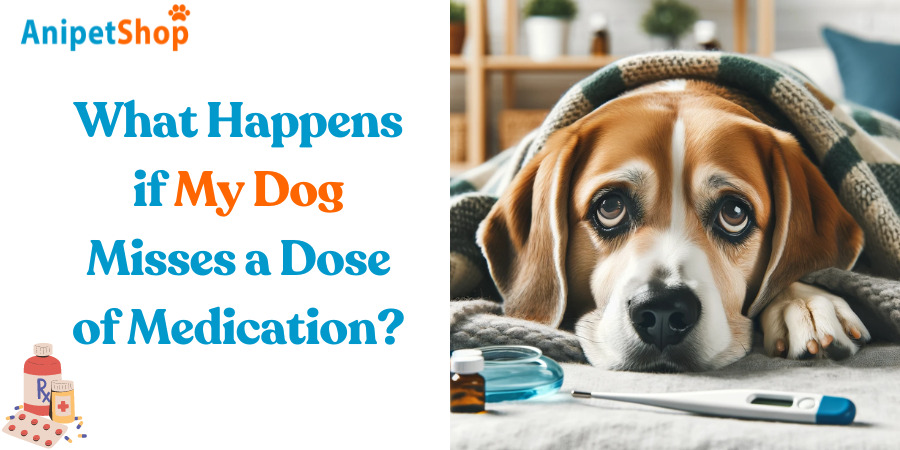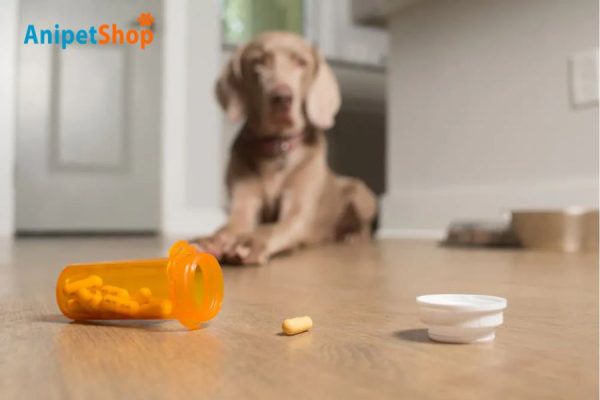What Happens if My Dog Misses a Dose of Medication?
If your dog misses a dose of medication, it’s important to act quickly and appropriately. For some medications, such as insulin, missing a dose can result in high blood sugar levels, leading to increased drinking and urination, and in severe cases, the life-threatening condition diabetic ketoacidosis. However, for other medications like heartworm prevention or antibiotics, the timing of the missed dose and how you respond can vary.
In this article, we’ll guide you through what steps to take if your dog misses a dose, how to manage different types of medication, and when you should contact your vet for advice. Whether it’s a one-time miss or a repeated issue, understanding how to handle it will help protect your dog’s health and keep you prepared for the unexpected. Stay with us as we cover everything you need to know to handle missed doses with confidence!
Key Takeaways
- Administer the medication immediately if only a few hours have passed since the missed dose.
- Missing a dose can result in health complications, particularly for chronic conditions.
- A slight delay in monthly medications is usually not critical, but monitor for any signs of exposure.
- Consult a veterinarian for specific guidance if more than 15 days have passed since the missed dose.
- Use reminders or pet medication apps to prevent missing future doses.

My Dog Missed A Dose of Medication – What do I Do?
If your dog misses a medication dose, the best action is to stay calm and follow these steps:
- Administer the missed dose immediately, but only if it’s within a few hours of the scheduled time. If you’re unsure or the medication is sensitive, call your veterinarian to confirm what to do next.
- Timing is key: For most medications, giving it a little late isn’t a major problem. However, certain medicines like heartworm prevention or antibiotics may need more precise timing to remain effective, so consult your vet before taking action.
- If you are more than a day late, for monthly treatments like heartworm or flea prevention, it’s often better to skip the missed dose and give the next one as scheduled. Always check with your vet for advice in these cases.
- Monitor your dog closely: After the missed dose, watch for any unusual signs or symptoms like vomiting, lethargy, or loss of appetite. If your pet shows any strange behavior, contact your vet immediately.
- Heartworm-specific considerations: Heartworm medication often comes with a 15-day grace period, meaning a dose missed by less than 15 days might still be effective. However, if a full month is missed, a heartworm test may be necessary to ensure your dog hasn’t contracted the parasite.
Further Tips for Handling Missed Medications:
- Veterinary guidance is critical: Your veterinarian is the best source of advice, as different medications have varying protocols. Never double-dose unless directed by a vet.
- Antibiotics: Missing antibiotics can reduce their effectiveness and lead to resistance. It’s important to follow your vet’s guidance closely and avoid skipping doses for this type of medication.
- Track your dog’s health after a missed dose: For medications related to chronic conditions, ensure that no symptoms worsen or new ones appear after a missed dose. Behavioral changes could indicate complications from missed treatment.

What Happens When Your Pet Misses a Dose of Their Medication?
When your veterinarian prescribes medication for your dog, the dosage and timing are critical to maintaining the correct level of the drug in their bloodstream for effective treatment. Missing a dose can reduce the medication’s effectiveness, so it’s important to check with your vet if you miss giving a dose.
For antibiotics, missing even one dose may hinder the treatment process. If your dog misses more than one dose, the risk of bacterial resistance increases, possibly requiring a longer course or stronger antibiotics to fully treat the infection. Timely administration is crucial to avoid setbacks in treatment.
In the case of ongoing medications like insulin, the stakes are even higher. Missing a single dose of insulin can cause a dangerous spike in blood sugar levels, leading to symptoms like increased thirst and urination. More seriously, it can trigger diabetic ketoacidosis, a life-threatening condition requiring emergency care.
Preventative medications for parasites, such as flea, tick, and heartworm treatments, also need to be administered consistently. Missing a monthly dose of flea or tick prevention can leave your dog vulnerable to bites and diseases these parasites can transmit. Missing heartworm medication is especially risky. If your dog is bitten by a mosquito carrying heartworm larvae, they can become infected, which may lead to costly treatments or, in the case of cats, no available treatments at all.
How to Remember Your Pet’s Medication
Here are some practical ways to ensure your pet receives their medication on time:
- Set Up Automated Reminders
Sign up for automatic email or text message reminders for your pet’s preventative medications. Many services offer these reminders to ensure your pet stays protected year-round. - Use Your Smartphone’s Calendar
Schedule recurring reminders on your phone’s calendar. This will notify you at the right time, making it easy to stay consistent with your pet’s medication routine. - Mark a Physical Calendar
For those who prefer a visual approach, use stickers or a marker on a wall calendar to mark medication days. Plan for the whole year, ensuring you mark each month to avoid missed doses. - Discuss Injectable Options with Your Veterinarian
If you struggle with daily pills, ask your vet if there is an injectable option available. Injections often last longer, which means less frequent dosing and fewer chances to miss a dose.
Frequently Asked Questions
Can Missing a Dose Cause Long-Term Health Issues in My Dog?
Yes, missing a dose can lead to long-term health issues for your dog, depending on the medication. It’s crucial to understand the implications of a missed dose and the importance of medication timing. Follow dosage adjustment guidelines closely and keep an eye on your dog’s health. Consult your vet for tailored health monitoring strategies.
How Can I Find a Reliable Dog Sitter for Medication Administration?
To find a trustworthy dog sitter for administering medication, start by checking their qualifications and certifications. Look for experience in medication administration techniques. Ensure they have solid emergency contact protocols and use medication tracking apps. Interview them to confirm their reliability and professionalism.
What Should I Do if My Dog Refuses to Take Their Medication?
If your dog won’t take their medication, try these strategies: mix it with their food, use pill pockets, or use behavioral training. Reducing their stress during the process is crucial. If these methods fail, consult your vet for more advice.
Are There Natural Alternatives to Conventional Pet Medications?
Yes, natural alternatives to conventional pet medications exist. You can explore herbal remedies, dietary supplements, essential oils, holistic treatments, and even acupuncture therapy. Always consult your vet to ensure these options are safe for your dog.
Conclusion
In summary, missing a dose of your dog’s medication requires quick but careful action. For most medications, such as antibiotics or heartworm prevention, giving the dose late or skipping it altogether might be acceptable, but always consult your veterinarian first. In critical cases, like insulin, missing a dose can have severe consequences, including diabetic ketoacidosis. By closely monitoring your dog’s behavior after a missed dose, setting up reminders, and staying in touch with your vet, you can ensure your dog’s health remains stable. Remember, consistency is key to your pet’s well-being, so proactive planning can make all the difference.
Related Post: https://anipetshop.com/dog-care/missed-heartworm-preventative-dose/
Lily Watson is an author specializing in veterinary care in Australia. With a profound passion for animal welfare and a solid foundation in veterinary science, Lily has dedicated herself to disseminating valuable knowledge and information for both pet owners and professionals in this field.

